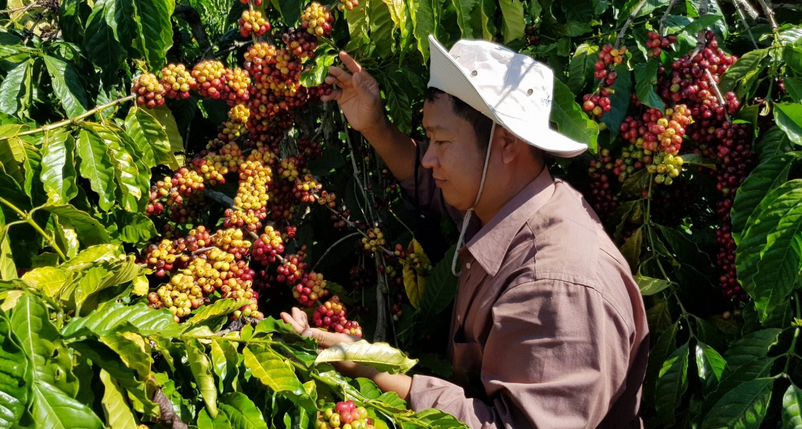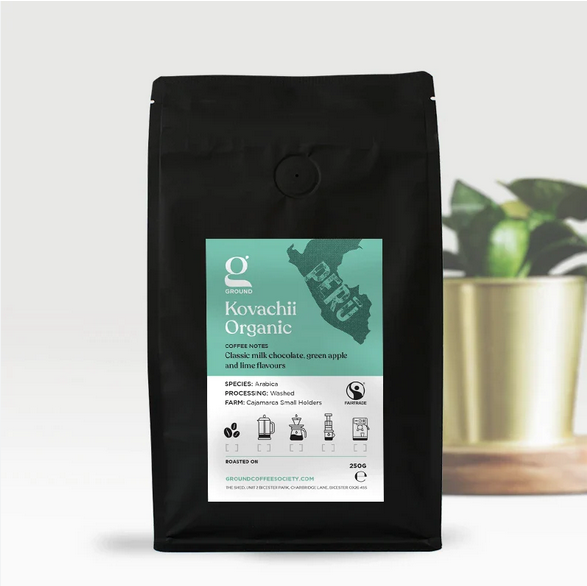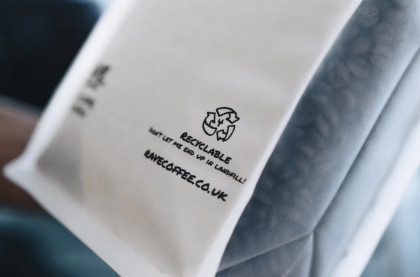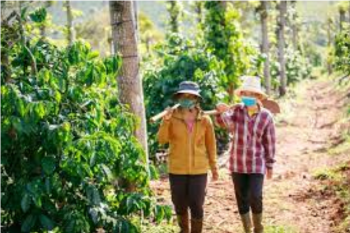The journey of coffee from bean to cup has undergone a significant transformation, especially in terms of ethics and sustainability. Ethical coffee farming, once a niche concept, has now become a pivotal aspect of the global coffee industry.
Ethical coffee farming refers to practices that are environmentally sustainable, socially responsible, and economically viable. It involves fair treatment and compensation for farmers, sustainable farming methods, and a commitment to the well-being of the farming communities.
The shift from mere charity to sustainable business models in coffee production marks a new era where the focus is not just on profit, but also on people and the planet. The evolution of ethical coffee practices reflects a growing consciousness among consumers and producers alike, recognizing the need for responsible farming and fair trade practices.
In this article we have written here at mycoffeebeanz.com we will explore ethical coffee farming and its journey towards sustainability.

An Overview of Market-Based Approaches
The inception of ethical coffee farming can be traced back to early initiatives that involved labeling coffee products to highlight their ethical origins. The movement, initially led by European initiatives and civil society organizations, laid the foundation for a more sustainable and equitable coffee industry.
The role of civil society in fostering sustainable coffee practices has been instrumental, driving the industry towards a more responsible future.
Learning from Sustainability Initiatives
The impact of these sustainability initiatives extends beyond the economic benefits to farmers. They have significantly influenced the social and environmental conditions in coffee-producing areas.
The integration of social and environmental science into coffee farming strategies has led to more informed and effective approaches to sustainability. These efforts have not only improved the quality of life for coffee farmers but also contributed to environmental conservation.
Governance and Supply Chain Factors
Despite the progress, ethical coffee farming faces challenges, particularly in governance and supply chain management. Farmers often grapple with limitations imposed by these factors, which can restrict the benefits they receive from engaging in sustainable practices. Factors include:
Regulations and Standards: National and international regulations, including environmental, labor, and trade policies, significantly impact coffee production and distribution. Standards such as Fair Trade and Organic certifications also play a vital role.
Quality Control and Certification: Quality control measures and certification processes ensure product consistency and adherence to certain standards, affecting market access and consumer trust.

Trade Agreements and Tariffs: International trade agreements and tariffs influence the flow of coffee across borders, affecting supply chain dynamics and pricing.
Processing and Transportation: How coffee is processed (wet or dry method) and transported (including the logistics and infrastructure involved) impacts its final quality and cost.
Supply Chain Transparency: Efforts to increase transparency in the coffee supply chain aim to ensure fair compensation for farmers and sustainable practices, influencing consumer choices and brand reputations.
Relationships Between Stakeholders: The dynamics between farmers, intermediaries, roasters, and retailers, including direct trade practices, shape the overall efficiency and fairness of the supply chain.
Additionally, the scope of companies’ interests in sustainability can vary, impacting the overall effectiveness of these initiatives.

Investments and Coffee Industry Initiatives
The role of industry investments in promoting sustainability cannot be overstated. These investments often take the form of premiums paid to farmers for:
- Sustainable practices Investments in sustainable farming practices include teaching farmers about eco-friendly techniques such as shade-grown coffee, which helps preserve biodiversity, and organic farming, which eliminates the use of harmful pesticides and fertilizers.
- Research and Development: Investment in research to develop new coffee varieties that are more resistant to diseases and climate change effects, ensuring the sustainability of coffee farming.
- Direct Trade Initiatives: Establishing direct trade relationships with farmers, where coffee buyers work directly with coffee growers, ensuring a higher income for farmers and more transparency in the coffee supply chain.

Successful industry-wide initiatives have shown that when companies invest in sustainability, the entire supply chain, from farmer to consumer, benefits. You can discover more about these industry initiatives and their impact on ethical coffee farming from the Rainforest Alliance.
Community and Environmental Impact
The journey towards sustainable coffee production extends far beyond the individual farm. It encompasses a broader spectrum of community and environmental impact. Key to this expansion is the role of training and technical assistance provided to farmers on best practices in coffee cultivation, harvesting, and processing; for example, knowledge transfer about climate-smart agriculture to adapt to changing environmental conditions.
Moreover, supporting processes outside the farm is crucial for a broader community impact. This involves engaging with local communities to ensure that the benefits of sustainable coffee farming extend to everyone involved, from workers to local residents. Community Development Projects can include building schools, healthcare facilities, or providing access to clean water in coffee-growing communities, funded by a portion of the profits from coffee sales

This holistic approach ensures that the environmental, social, and economic aspects of coffee farming are balanced, leading to a more sustainable future for the coffee industry.
The Future of Ethical Coffee Farming
As we look at the current landscape of ethical coffee farming and brewing, it is clear that significant strides have been made. However, the journey is far from over and the future of ethical coffee farming lies in continuous improvement and adaptation.
Emerging trends, include the integration of technology in farming practices and the increasing demand for transparency in the supply chain, present new opportunities for growth and improvement.
An informative video looking at all areas of ethically coffee farming
Technological advances
Ethical coffee farms are already leveraging technology in some of the following ways:
Water Conservation Technologies: Investment in technologies that conserve water and reduce wastage during coffee processing. This includes the development of water recycling systems and efficient irrigation techniques.
Renewable Energy Use in Coffee Processing: Encouraging the use of renewable energy sources, like solar or wind power, in coffee processing to reduce the carbon footprint of coffee production.
Waste Reduction and Recycling: Initiatives to reduce waste in coffee production, such as using coffee pulp as compost or converting it into bioenergy, and implementing recycling programs in the coffee supply chain.
Precision agriculture, using data analytics and IoT devices, can optimize resource use and crop yields and will become increasingly prevalent.
Increased transparency in the supply chain
Certification programs like Rainforest Alliance, Fair Trade, and Organic are becoming more important in verifying ethical practices. In the future, there might be an increase in the number of certifications and perhaps more rigorous standards for obtaining them. Blockchain technology could also be used to improve transparency in the coffee supply chain.
Takeaways
In conclusion, the journey towards ethical coffee farming and brewing is ongoing. It’s a path marked by challenges but also filled with opportunities for creating a more sustainable and equitable coffee industry. As consumers, our choices can influence this journey, steering it towards a future where every cup of coffee is a testament to ethical and sustainable practices.
FAQs
What is the Impact of Ethical Coffee on the Environment? Ethical coffee farming practices aim to minimize environmental impact. This includes using sustainable farming methods that protect biodiversity, reduce chemical usage, and conserve water.
How Can Consumers Support Ethical Coffee Farming? Consumers can support ethical coffee farming by purchasing coffee that is certified as fair trade, organic, or sustainably produced. This not only supports the farmers but also encourages more sustainable practices in the industry.
What are the Challenges Facing Ethical Coffee Farming? Challenges include market volatility, climate change, and the need for more education and resources for farmers to implement sustainable practices effectively.
What Does the Future Hold for Ethical Coffee Farming? The future of ethical coffee farming looks promising, with an increasing number of consumers and companies recognizing the importance of sustainable and fair practices. Continued innovation and commitment to ethical standards will drive further improvements in the industry.

Written by Robbie – Coffee Writer and Researcher at MyCoffeeBeanz.com
Robbie has over 15 years of extensive experience working in the coffee industry in marketing. As a native New Yorker he loves the hustle and bustle of a big city and enjoys nothing more than breaking up his busy day with trips to the nearest coffee shop for a double espresso. Find out more about Robbie
